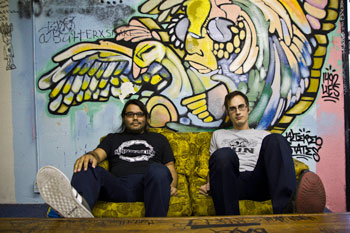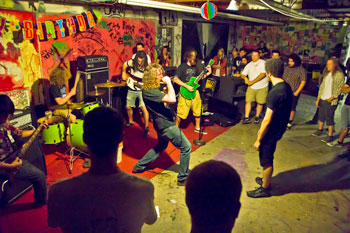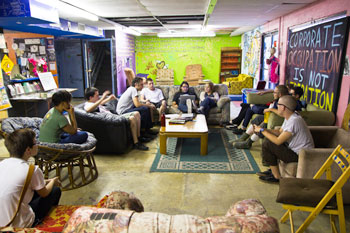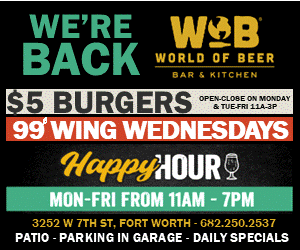It’s not the kind of place that, at first glance, would make parents want to let their teenagers hang out for an evening. Inside the small two-story building on Fort Worth’s South Side, battered, dingy couches sit below band fliers and huge graffiti-art slogans on the walls, including one lengthy manifesto that reads, in part:
“1919 is socking it to the puppets of consumer culture by using DIY attitude and staying punk. Evolve with others at 1919!”
 On the other hand, if the parents (or their parents) were young adults in the ’60s or ’70s, the place may seem comfortingly familiar. In many ways, the scrappy, always-nearly-broke and nearly famous venue located at and known as 1919 Hemphill may seem like a throwback to those questioning, rebellious days — although it’s been filtered through the punk music sensibility of the late ’70s and early ’80s. The important difference from a parental point of view: no drugs, no booze, no smoking. And all ages are allowed at the shows.
On the other hand, if the parents (or their parents) were young adults in the ’60s or ’70s, the place may seem comfortingly familiar. In many ways, the scrappy, always-nearly-broke and nearly famous venue located at and known as 1919 Hemphill may seem like a throwback to those questioning, rebellious days — although it’s been filtered through the punk music sensibility of the late ’70s and early ’80s. The important difference from a parental point of view: no drugs, no booze, no smoking. And all ages are allowed at the shows.
The major common denominator, the one that brings together 1919’s teen and adult patrons as well as the spirit of those earlier times, is music. On the national circuit of venues that are part of the semi-underground movement known as DIY (Do It Yourself), 1919 is considered a top spot for bands to play. The venue is drawing larger local audiences than ever to its live shows. National and big-name local acts such as Matt and Kim, Andrew Jackson Jihad, Raging Boner, and Hentai Improvising Orchestra have played 1919.
But 1919 has always sought to be much more. For nine years, the organization has provided a space in which people can learn and talk about things that don’t get much acceptance in conservative Cowtown: There’s a stock of radical political and cultural literature, and occasional meetings of groups like the old-line International Workers of the World and the feminist anti-war group Code Pink. All sorts of activist groups are welcome to bring their pamphlets and discuss their concerns.
The club isn’t just a step removed from the mainstream — in many ways it’s flat on the other side of town. In some years, the crew of volunteers who operated it numbered less than half a dozen — about the same as the size of the crowds at some of the events. The place has always relied on donations to stay open, from individuals (including the volunteers themselves) and businesses like the Southside restaurant Spiral Diner & Bakery. But in the often bumpy nine years since it opened, 1919 has earned its status as a unique and enduring community space.
There’s no widespread agreement on when the DIY culture began; many people trace it back to the punk music culture of the late ’70s and early ’80s, when musicians began turning away from major labels and traditional club venues to record and perform music their own way. (Don’t confuse this DIY with the home repair trend — it’s not about fixing the plumbing.)
![Finley: “[1919] feels the way it does because of all the people who’ve come through it.” FEATURE_2](https://www.fwweekly.com/wp-content/images/stories/images/10-12-2011/FEATURE_2.jpg) It’s also difficult to say just how many DIY spaces there are in the United States It’s truly an underground culture — they don’t advertise or have Facebook pages, and many don’t even have websites. They operate strictly by word of mouth. One of the longest running spaces in the country, 924 Gilman in Berkeley, Cal., has been open since 1986. There are also famous spots in Brooklyn, San Diego, Tucson, and Chattanooga and at least four other DIY spaces in Texas.
It’s also difficult to say just how many DIY spaces there are in the United States It’s truly an underground culture — they don’t advertise or have Facebook pages, and many don’t even have websites. They operate strictly by word of mouth. One of the longest running spaces in the country, 924 Gilman in Berkeley, Cal., has been open since 1986. There are also famous spots in Brooklyn, San Diego, Tucson, and Chattanooga and at least four other DIY spaces in Texas.
Al Rios, 27, a Fort Worth public schoolteacher who’s helped run the Hemphill venue since it opened in 2002, explained the culture this way: “I think of DIY as people who enjoy doing things without the help of big companies or large amounts of money. We are volunteering to help keep this space open so we can do the stuff we want to in the building.”
The idea for the place came from a Fort Worth character named Cri Rivera. He wanted a DIY space in Fort Worth that would serve as a hub for “radical culture” — not only music, but also visual art, underground publications, grassroots activism, and community organizing.
Rivera held benefit bowling nights, garage sales, and other events to raise money. After a couple of tentative attempts in other buildings, he eventually found the current two-story space at 1919 Hemphill. It looks like a small warehouse from the outside, with several small rooms on the first floor and a large open room on the second. He told the owner all about his plans for the place and managed to talk him down on the rent.
“There weren’t a lot of non-corporate places [in Fort Worth] for people to get together and make music and have a dialogue,” he said. “The idea for 1919 was to create a space that reflected the people directly involved and not the need to make a profit.”
Rivera stayed active with the original set of volunteers for about three years, then pulled back a bit after he started dating his girlfriend, who lived in Allen. (They’ve since married and had kids.) 1919 then moved into the hands of volunteers Rios and Rick Vandeveerdonk, 29, a full-time manager at Spiral Diner.
“[Originally] Cri wanted more of an arts and community activism space, and Al and I wanted more of the shows,” said Vandeveerdonk. “But the shows are what’s kept us open.” 1919 Hemphill hosts all-ages weekend concerts that feature local and touring bands. Many of the latter crash at Vandeveerdonk’s house or another volunteer’s place while they’re in Fort Worth. Each show costs $6 ($5 if it’s only local acts), though no one is turned away if they can’t pay. They might, however, be asked to volunteer some time in return.
Torry Finley, 18, has become of 1919’s core volunteers. A friend took him to his first 1919 Hemphill show early last year, and Finley began volunteering regularly after that. He was born in Oklahoma City but attended high school in both Grapevine and Fort Worth. The moment he set foot inside 1919, he knew it was different.
“The thing about going to school in Grapevine is, you’re either at the mall doing hard drugs or you’re really into school and God,” Finley recalled. “I came to Fort Worth and found out there’s a space where you could express yourself freely, and the main agenda wasn’t to make money. They weren’t trying to scam you. You could go and see a bunch of amazing talented bands, and feel like you were a part of something.”
 Finley has done it all at 1919 — helped set up the P.A. system for bands, cleaned the restrooms, washed the cups in the kitchen area, and worked the door at concerts. He does whatever needs to be done, but said it’s never a drag because all the volunteers really want to be there. There’s a strong feeling that everyone’s participating in a larger creative entity.
Finley has done it all at 1919 — helped set up the P.A. system for bands, cleaned the restrooms, washed the cups in the kitchen area, and worked the door at concerts. He does whatever needs to be done, but said it’s never a drag because all the volunteers really want to be there. There’s a strong feeling that everyone’s participating in a larger creative entity.
“When I think of 1919, I don’t think of a building or an establishment,” he said. “I think of the faces of the people I’ve met there. It’s a community space. It feels the way it does because of all the people who’ve come through it.”
From the start, Vandeveerdonk and Rios took the egalitarian ethos of the DIY model very seriously. They started hosting open business meetings where volunteers and anyone else could come in and
offer ideas for running the place. It was decided long ago that 1919 wouldn’t have a board of directors — too hierarchical — which is one of the reasons they’ve never tried to incorporate as a nonprofit. (They also don’t want any of the constraints on grassroots political activity that nonprofit status involves.)
Plenty of people had grand plans for 1919, but the volunteer energy necessary to execute them was often in short supply. Vandeveerdonk and Rios just staffed each event as it came, calling on friends to work the door at a live show or unlock and set up the space for a community group meeting. Vandeveerdonk wound up doing a bunch of the work himself.
“There was a time when we had just four or five volunteers running the place,” said Rios. “And that meant Rick was doing about 80 percent of the work, and we were doing about 20. The fact that he stuck it out for so long is the main reason 1919 stayed open.”
It took them eight years to figure out it was easier not to invite the whole world to their monthly business meetings. Someone had the genius idea of putting
up a schedule and asking people to commit to meetings and events. Soon, a select group of about 11 volunteers proved that they were committed to showing up on time and doing whatever needed to be done.
It’s hard to generalize about the type of volunteer who helps keep 1919 Hemphill running, though there are a few commonalities. They’re in their late teens through mid-20s. They tend to be left-leaning in their political views. “None of us are Republicans,” Vandeveerdonk said, perhaps stating the obvious. Most of them love punk music.
“The current volunteers all have the grassroots DIY philosophy,” said Vandeveerdonk. “There was a discussion about whether we should identify ourselves as an anarchists’ collective. But we can’t say we’re all anarchists. We have our own personal political views.”
1919 Hemphill’s existence depends on revenue from the live shows that play weekend nights. Local or national, the musicians know to expect the no-frills, grassroots DIY vibe. An average bill includes one national touring band and two or three local outfits. Vandeveerdonk said he tries to make sure that the out-of-town bands are not the headliners, in the spirit of supporting local musicians. Still, 1919 Hemphill is considered a destination spot for bands that are into the DIY ethos — Vandeveerdonk gets e-mails from musicians all over the country who want to play there.
Rios handles most of the money issues at 1919. “When we have a show, we split whatever we make at the door with the touring bands,” he said. “If there’s any money left over, we’ll pay the local bands. But they know not to expect it. And they usually wind up telling us to keep it and put it back into the space anyway.”
The crowds that turn out to listen aren’t big — usually 10 to 25 people. Like the volunteers, they’re mostly teens and people in their 20s. While musicians and audiences 21 and up will frequently hit the bars after a 1919 show, Vandeveerdonk, who is a vegetarian and only a light drinker, strictly enforces the no-alcohol and no-smoking policy inside the building. Kids as young as 13 sometimes show up, and Vandeveerdonk said it’s a point of pride with him that parents can drop off their kids for an evening and feel safe that they won’t be tempted by drugs or booze.
Does he ever feel like a babysitter? “The 13-year-olds are usually fine,” he said. “It’s the people over 21 you have to watch. Sometimes you have to go into ‘dad mode’ with them.”
Amy McNutt, owner of Spiral Diner, is also one of the biggest financial contributors to the space. She comes to Vandeveerdonk every month with an offer of $200. He takes it only if it’s absolutely necessary. McNutt also promotes 1919 events in the restaurant via fliers, pamphlets, and e-mail promotions.
“I wish there had been a place like that when I was growing up in Grapevine,” said McNutt. “I would’ve been hanging out there all the time. So much of the time going to see a band is tied up with getting wasted, but even young kids can go there, enjoy themselves, and be safe.”
 Rios is honest about his frustration over 1919’s reputation among some Fort Worth bands and audiences that it’s not a “grown-up” place to go. How can it be, the line goes, when all ages are admitted and they don’t permit alcohol and tobacco? Rios would love to change this perception and bring in an older crowd.
Rios is honest about his frustration over 1919’s reputation among some Fort Worth bands and audiences that it’s not a “grown-up” place to go. How can it be, the line goes, when all ages are admitted and they don’t permit alcohol and tobacco? Rios would love to change this perception and bring in an older crowd.
“Personally, I don’t like being around drunk people and cigarette smoke,” he said. “But a lot of people who’ll go see bands at a bar won’t come to 1919. They can’t have fun without drinking. That drives me a little crazy.”
Like many DIY spaces, 1919 Hemphill operates a lending library of activist literature — books, magazines, and pamphlets on the women’s movement, the men’s movement, environmentalism, drug policy reform, animal rights. However, the most popular items in the library are the homemade CDs and DVDs that national and local bands donate when they play there. Vandeveerdonk admits that the activist literature is rarely touched.
1919 hasn’t hosted as many political groups in recent years as the operators would like. Besides the occasional meetings by Code Pink and IWW, the space currently hosts a monthly film series called Relevant Film Project created by local filmmakers Benjamin Marc Howell and Cameron Bruce Nelson that shows documentaries on subjects from the BP oil spill in the Gulf to animal abuse in slaughterhouses, circuses, and medical testing labs. The space has also begun hosting a monthly open fair called A Night of Progress in which activist organizations can set up tables and offer literature about their fields of concern. Groups like Mercy For Animals and Black Cat Collective, an anarchist and workers’ rights group, have participated in the past.
One group that began meeting there earlier this year is DFW Craftivism, which hosts various craft events for sewing, quilting, patch-making, ’zine-making, and screen-printing. But there’s a twist: The concept of “craftivism” has been a part of the DIY movement for years. The philosophy holds that people getting together and making things with their own hands is itself a radical, anti-corporate act. There is also a feminist angle to the philosophy — craftivists see their goal as reclaiming once trivialized, traditionally female domestic activities and honoring them as inherently valuable acts of creativity and community.
Emily Reed, the 23-year-old Texas Woman’s University student who runs DFW Craftivism, started holding meetings at 1919 in March. She got into craftivism in part because all her friends had passionate interests in things like veganism and the environment. She just liked sewing, so “I decided to make my passions useful.”
1919 is “completely free and accessible, and they reach out to a wide variety of people,” she said. “Al and Rick aren’t sexist or ageist. They welcome more than just the punk people who show up for the shows. They’re very resilient to keep this kind of space open for nine years.”
You can’t really measure the success of a DIY space like 1919 Hemphill Street in conventional ways. The crowds at the live shows aren’t huge, money is an ongoing issue, and there’s not exactly a consistent groundswell of radical political activity in Fort Worth. But one sign of success for Vandeveerdonk is how hard the core crew of young volunteers are working to help keep the doors open.
“I can be home on a Sunday night while an event is going on,” he said. “I don’t have to be up there all the time. Our twentysomething volunteers are [taking on] more responsibilities. I’ve told them I’m going to try and do it less and not always be the main person.”
Vandeveerdonk may be easing his participation in 1919 Hemphill a bit, but he swears he’s not burning out. The Fort Worth DIY space that he and Rios have kept alive for nearly a decade now is running more smoothly than ever before. Longevity counts for a lot in the underground DIY scene, where people come and go and spaces open and close without notice.
For her part, McNutt feels confident that the contributions from Spiral Diner are supporting a much-needed cultural and community venue, one that’s unique not only to the neighborhood but to a generally conservative city.
“The [activist] groups that meet there, whether you agree with them or not,” she said, “they’re expressing themselves and trying to create change. 1919 is a real asset to the South Side.”












[…] The Fort Worth Weekly’s cover story this month is an article about 1919 Hemphill. You can read it here. […]
[…] Evolving at 1919 – (Don’t confuse this DIY with the home repair trend — it’s not about fixing the plumbing.) It’s also difficult to say … There are also famous spots in Brooklyn, San Diego, Tucson, and Chattanooga and at least four other DIY spaces in Texas. […]